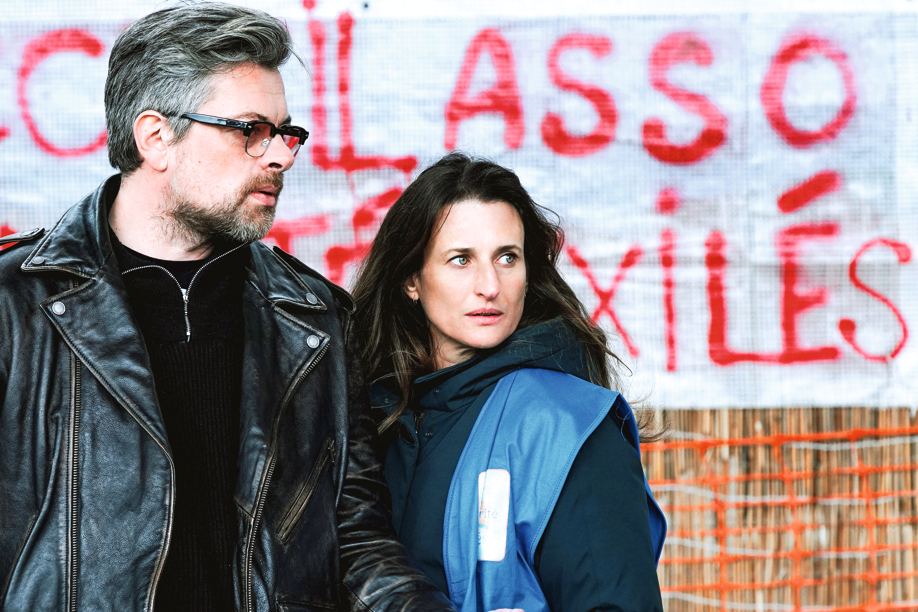"The Devils of Loudun" at the Bavarian State Opera: The demon is in the details
Created: 06/28/2022, 15:33
By: Markus Thiel
Possessed or "just" unwanted: Jeanne (Aušrine Stundyte) has to undergo the exorcism of Father Barré (Martin Winkler).
© Wilfried Hösl
This has nothing to do with local cuisine: Penderecki's "The Devils of Loudun" is the first opera premiere of the Munich Opera Festival.
A strong musical faction meets the direction of Simon Stone.
And it also reveals the weaknesses of the piece.
You can't pack more into 110 minutes.
Sinful love, secretly lived out sexuality, life-hostile religious dogmas, a suppressed political free spirit, self-deception and denunciation out of disappointed affection including mass hysteria.
And best of all: Everything really happened, in 1634. And still so virulent that scenic tutoring was not needed at all.
The guys in protective uniforms bear the lettering "Police", later the nuns paint feminist slogans on their nightgowns or directly on their skin.
Communication takes place diligently via mobile phones and Macbooks: everything is still up to date, the large director's fence post beckons
(story at the end of the article)
.
We know from his productions that Simon Stone gets tangled up in his modernisms.
But here, at the first premiere of the Munich Opera Festival, the one who has been asked too much remains surprisingly reserved.
The story is too strong.
And anything but culinary and therefore customary, which is why many a gala guest pushed through the rows outside before the last note of Krzysztof Penderecki's "The Devils of Loudun".
Vladimir Jurowski is the right man for this piece
The penultimate new production in the first year in office of artistic director Serge Dorny and general music director Vladimir Jurowski stays in line.
What is being served this season is contrary to the past 20 years of the State Opera.
Always with the admonishing pedagogical look: See and hear what you missed in Munich.
"The Devils of Loudun", Penderecki's first opera, premiered in 1969, is based on an incredible story and at the same time shows the greatest respect for it.
The music, a creeping sonority produced with gigantic instruments, circling around black holes, only rarely includes a second and third level.
Penderecki, who is very well versed in his work, likes to limit himself to the illustrative or – in view of the extended speaking distances – to the accompaniment up to the radio play effect.
Less interpretation is required with this extensive instrumentation, more coordination.
And Vladimir Jurowski, as he demonstrated at the start of the season with Shostakovich's "Nose", is the right man for this: cool even in the wildest turmoil, a detail-conscious organizer who clears and guides instead of just picking out effective things with the state orchestra, which goes along with it in a concentrated manner.
Bob Cousins rotates his revolving stage almost continuously.
The idea is hung and signals speed, but it actually fits here.
Fast, gliding changes of the more than 30 scenes and always new insights into a concrete cube are made possible.
It offers space for many things: for a cell, a stairwell, even for a large sanctuary in which the sinful nuns are allowed to pour themselves picturesquely onto the steps.
And at the end for a mini-crematorium, where behind a black wall Grandier's battered body flares towards the afterlife.
Stone falls into his usual realism traps a few times, otherwise tells the story densely and clearly in one piece.
He cleverly relies on the story and his charismatic actors.
Premiere was about to burst
There are plenty of them here – even if the premiere was about to burst.
Wolfgang Koch, actually intended for the central character of Grandier, tested positive shortly before the dress rehearsal.
The splitting up of the role brings a distinctive alienation effect (which Stone would have needed in other places as well): Jordan Shanahan sings with a virile baritone out of the ditch, actor Robert Dölle lets the clergyman on stage become an emaciated Ecce Homo struggling for himself and his happiness in life .
Aušrine Stundyte, as Jeanne, who is said to be possessed by demons, is a very harsh heroine.
She brings her Elektra experience to the soprano drama, but it is more interesting how she explores nuances in the lower decibel range (also in the spoken passages).
Some of the fidgeting looks like the tried-and-true sequel to Friedkin's cinema shocker "The Exorcist" - which shows that Stone does not have a good hand for the fine mechanics of such figures, for the detail at all, and then takes refuge in the drastic.
Dazzling character studies, probably mostly on their own initiative, succeed Wolfgang Ablinger-Sperrhacke as royal commissioner Laubardemont, who indicates a homoerotic affection for Grandier, also Kevin Conners (Adam) or Ulrich Reß (Mignon), especially Martin Winkler as bizarre exorcist Father Barré.
also read
Nice rapper: Family concert with Cro in the sold-out Tollwood music arena
The Fantastischen Vier after the concert in constant rain: "We won't forget that, Munich!"
Even after the Hamburg premiere there were qualms about Penderecki's "Teufel".
Although the music also urges effective gestures, they are rather cool, dramaturgically weakening themes at the end instead of thoroughly psychological drama.
In a strange way, the piece shies away from identification.
Perhaps the greatest merit of the Munich evening is an unintentional one: that it reveals the work's problems and fractures.
The plot:
Jeanne, prioress of a monastery, falls in love with the priest Grandier.
He's already had a few affairs.
He is also considered a liberal and opponent of the powerful Cardinal Richelieu.
Jeanne wants to make Grandier the confessor of the monastery, which Grandier refuses.
She then accuses him of seducing her and her fellow sisters with demons.
Richelieu's supporters sense their chance.
Exorcisms are performed on the nuns, Grandier is burned.









